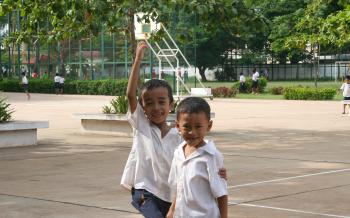Life is harsh for women and children in north-western Cambodia

The city of Siem Reap is located in north-western Cambodia, not far from the border with Thailand. One of Cambodia's greatest tourist attractions, the Angkor temples are situated only a few kilometres away. The over one hundred temples were built between the 9th and the 13th centuries and were declared a World Heritage Site by UNESCO in 1992.
The arrival of political stability has meant that tourists are finally able to come to the area. The increasing number of visitors has improved the economic situation in the city.
However, the province of Siem Reap remains predominantly rural. The majority of the people live off agriculture, with rice being the main crop. Many households do not have access to agricultural land of their own – they work as seasonal day labourers. Others make a living in the informal sector where the working conditions are unregulated, insecure and badly paid.
It is estimated that around 46 per cent of households in the province live below the poverty line. A very high percentage does not have access to safe drinking water or a sanitary toilet. This lack of basic infrastructure, as well as food insecurity, has a negative effect on the health of women and children in particular. Children suffer from malnutrition and a significant number are underweight and stunted. The under-five mortality rate is high: deaths are often caused by water-borne diseases and respiratory infections. Women's health is also affected: the rate of anaemia in the region is higher than in other parts of the country and about one third of women receive no antenatal care from a health professional.
Providing children with a good start in life
Life for children in this north-western region is extremely harsh, especially in the more rural areas. Children are often required to work the land too, as they have to help provide food for the family. Because of their involvement in the fields, they often do not go to school – it is therefore hard to improve their prospects for their future. This is why we at SOS Children's Villages make the provision of education for children one of our main priorities. Furthermore, these stressful social and economic conditions have a huge impact on family life, and many fall apart, leaving children without parental care. The provision of family-based care gives children the support of a loving mother and siblings.
What we do in Siem Reap

SOS Children's Villages runs a number of activities in Siem Reap (previously known as Angkor-Siem Reap). Our programmes are designed to meet the needs of the children, young people and families who live in the area. Our day-care services and educational programmes, for example, are much valued by the local community. Children from poor families are awarded scholarships so that they can go to school.
For children whose families can no longer take care of them SOS Children's Villages provides a loving home in one of the 14 SOS families, where they grow up with their brothers and sisters and are cared for by an SOS mother. Many children who join our family-based care suffer from vitamin deficiency and skin diseases. These children often have not been to school at all, or only intermittently, and so we prepare them to join mainstream education.
The children attend the SOS Kindergarten, where they are taught together with children from local families. To parents who have to earn a living it is very important to have professional day care for their children, so that they are not forced to leave them unattended while they are at work. Older children attend the SOS Hermann Gmeiner primary and secondary school.
When young people are ready to move out of the SOS families they join our SOS Youth Programme when they start vocational training or go on to higher education. With the support of qualified professionals, the young people develop perspectives for their future, learn to shoulder responsibility and increasingly make their own decisions. The SOS Training Centre trains young people to become electricians, plumbers, carpenters and mechanics.